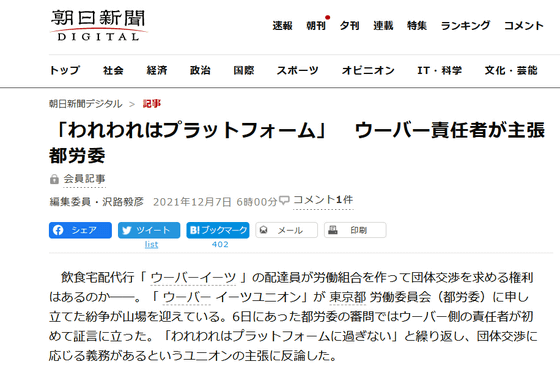The European Commission announces a new bill stating that ``gig workers should be given the rights they deserve as regular employees''

There is a growing movement in Europe and the United States to regularize
Improving working conditions in platform work
https://ec.europa.eu/commission/presscorner/detail/en/ip_21_6605
Gig economy workers to get employee rights under EU proposals | Gig economy | The Guardian
https://www.theguardian.com/business/2021/dec/09/gig-economy-workers-to-get-employee-rights-under-eu-proposals
According to the EC, more than 28 million people work through the internet and digital labor platforms in the EU, and this number is expected to reach 43 million in 2025. The economic scale of these digital labor platforms seems to have grown from 3 billion euros (about 380 billion yen) to 14 billion euros (about 1.8 trillion yen) in just five years from 2016 to 2020.
The bill is aimed at clarifying ``what the gig economy is legally'' in response to a request for courts in the EU to resolve around 100 disputes related to gig economy companies. Submitted to. France, Italy, Spain, Greece, and Portugal have already strengthened regulations on the gig economy in their domestic laws, but the EU has not been able to fully address the issue until now.
The EU recognizes anyone who works through digital labor platforms as self-employed, but the EC says around 5.5 million gig workers who should be treated as regular workers are incorrectly classified as self-employed. Masu.
According to the bill, companies that determine or set compensation limits, companies that manage work performance through electronic means such as apps, companies that place restrictions on working hours or amount of work, and companies that work for other companies. Companies that do not allow workers to interact with customers more than necessary, and companies that set rules regarding clothing and work methods, will be judged to have obligations as employers.
Furthermore, until now, in order for gig workers to be granted basic rights, they had to prove that they were employees of a company, and to prove that they had to go to court. However, if the new bill is enacted, the burden of proving employment status will shift from individuals to companies.

Nicholas Schmidt, EU Commissioner for Employment and Social Rights, said: ``Gig economy companies on the internet have taken advantage of legal gray areas to develop their business models.'' , clear criteria have been set for determining whether a platform is an employer, and if so, its workers are entitled to certain social protections and labor rights. Progress must be fair and inclusive, which is why this bill also addresses transparency and oversight of platform algorithms.”
In Japan, in response to Uber Eats delivery workers attempting to form a labor union and seek collective bargaining, the person in charge of Uber repeatedly told the Tokyo Labor Commission, ``We are nothing more than a platform.'' , refutes the union's insistence on collective bargaining.
'We are a platform' Uber chief claims Tokyo Labor Committee: Asahi Shimbun Digital
https://www.asahi.com/articles/ASPD66FF2PCYULZU01M.html

Related Posts:
in Note, Posted by log1i_yk







